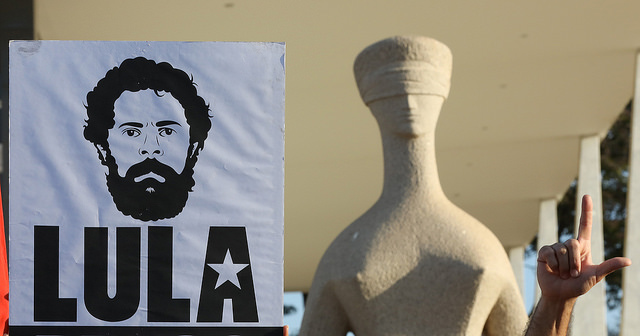Friar staging hunger strike for Lula’s freedom decries judicial branch in Brazil

“Hunger, unemployment, infant mortality, epidemics, famine, gas prices, food prices, transport fares. These are the main reasons that have led us to make this sacrifice,” said Friar Sérgio Görgen, a leader of the Small Farmers’ Movement (MPA) and one of the six activists who started a hunger strike this Tuesday calling the Supreme Court to release Brazilian ex-president Luiz Inácio Lula da Silva.
Görgen granted an interview to the Brasil de Fato Radio and pointed out how important it is to release Lula in order to restore democracy in Brazil. “To stop this situation from becoming even more serious, the country must return democracy to normalcy and Lula has to be released from prison. He is the victim of a fraudulent trial. He is not guilty of what he is accused of, he is a prisoner without a crime, he is being politically persecuted,” Görgen said.
The activist of the MPA explains why several people’s movements have decided to stage this demonstration: “A hunger strike makes sense when all other means have been used, to no avail, which is the case in Brazil. The judicial system is blocking all legitimate legal solutions that could and should be adopted.”
Görgen mentioned historical examples when hunger strikes were staged in defense of human rights. “There’s nothing new or crazy about it. Martin Luther King did it, I am staging my fifth hunger strike, Jaime Amorim has staged a hunger strike for 11, 12 days and got the settlement where he lives today. In Brazil, political prisoners during the military dictatorship staged a 33-day hunger strike demanding better prison conditions. Dom [Luís] Cappio staged a hunger strike so that the project to divert part of the flow of the São Francisco river [in northeastern Brazil] did not exclude the poor or using up more resources than the river can provide.”
The striker says Brazil’s judicial branch is responsible for aggravating the crisis in the country. “Now it’s the Supreme Court that can resolve this situation, and this is why our hunger strike is targeting it.” The friar said that, if something happens to one of the strikers, it’s the responsibility of the Supreme Court justices who voted to rule against a preventive habeas corpus petition that would not allow defendants to be arrested while their cases are still pending appeal. “And Lula can still appeal his sentence in two courts.
Edition: Mauro Ramos | Translated by Aline Scátola
